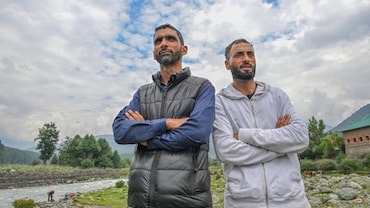- HOME
- /
- True Stories
- /
- Heroes
- /
Children Of Destiny: How Diana-Award Winner Neeraj Murmu Fought His Way Out Of Exploitation And Poverty
Once a victim of child labour, Neeraj Murmu now leads other disadvantaged kids out of the trap of exploitation and poverty
 “I’d been going to the mines with my mother and sister for as long as I could remember. How else will you feed your family?” says 22-year-old Neeraj Murmu. (Photo courtesy The Kailash Satyarthi Children’s Foundation)
“I’d been going to the mines with my mother and sister for as long as I could remember. How else will you feed your family?” says 22-year-old Neeraj Murmu. (Photo courtesy The Kailash Satyarthi Children’s Foundation)
Over the past few months, Neeraj Murmu, the son of a humble farmer, would begin his day early, heading off to the rice fields to help his father at seven in the morning. Once through, he would set off to one of the houses in Duliakaram, his tribal village in the Giridih district of Jharkhand, where a small group of boys and girls anxiously awaited his arrival. Over the next hour and a half, he tutored the children in school subjects in which they needed extra guidance. Through the day, Murmu visited three to four more houses in his village for more group classes.
Many take on extra work of this nature, both to earn and to help neighbourhood kids, but this 22-year-old is anything but ordinary. One of the winners of this year’s Diana Award—instituted in the memory of the Princess of Wales in 1999 to recognize and honour inspiring youngsters—Murmu was, nine years ago, a child labourer forced by poverty and exploitative practices to toil in the area’s mica mines. “I’d been going to the mines with my mother and sister for as long as I could remember. People work there because how else will you feed your family?” Murmu says. The mica he gathered fetched a mere ₹5 per kg.
Things changed when the Bal Mitra Gram (BMG), a child-rights advocacy programme of the Kailash Satyarthi Children’s Foundation, was implemented in Duliakaram in 2011. The initiative encourages people to send children to local schools instead of to work, and spreads awareness about how education and knowledge-building are key to breaking the cycle of economic and social deprivation.
Convincing Murmu’s parents to give up the boy’s earnings from the mines—however meagre—proved to be an uphill task, but the young man prevailed. “I strongly resisted going back. I desperately wanted to study,” says Murmu, who, at 14, started school full-time. Eager to make up for lost time and remain academically at par with other students his age, he pored over his schoolbooks for around 13 to 14 hours every day.
Murmu also became a member of the village Bal Panchayat—another feature of the BMG—a children-led body, recognized by the local council, charged with representing the village youngsters and their concerns. He also rescued 12 other children from the mines and got them enrolled in nearby government schools.
“I convinced the kids, and then their parents, that education is the future,” he says.
 Murmu (in white, next to the sign), with students at Kailash Satyarthi Public School, Duliakaram (Photo courtesy The Kailash Satyarthi Children’s Foundation)
Murmu (in white, next to the sign), with students at Kailash Satyarthi Public School, Duliakaram (Photo courtesy The Kailash Satyarthi Children’s Foundation)
Today, Murmu runs the Kailash Satyarthi Public School in Duliakaram where nearly 150 students are offered a brighter future. Established in 2018, the school, which began with just 30 students, ran out of a rented two-room accommodation.
“We teach kids up to class eight, preparing them well so that they can get admission to a different school in class nine,” says Murmu, who is himself in the process of earning a bachelor’s degree in political science from the Indira Gandhi National Open University (IGNOU).
Ever since the nationwide lockdown was announced by Prime Minister Narendra Modi in response to the COVID-19 pandemic, classes had to stop, but Murmu kept his wards up to speed in smaller, at-home sessions. “Unfortunately, I am not able to give sufficient time to each student. I am trying to focus on those who need a bit more help,” he worries.
At the Kailash Satyarthi Public School, learning is tailored to match every student’s abilities. Groups are made based on whether a student learns better through listening, rea-ding or writing. Murmu teaches the children for free, but parents pitch in with whatever they can, whenever they can. “When I started the school, there was resistance from villagers. I knew it would take time to bring everyone around. Today, parents in our village are more aware about the merits of education and extend full cooperation,” says Murmu, whose school now has more girls than boys. He has even hired a teacher from a neighbouring village at a monthly salary of ₹3,000.
This year has been quite eventful for Murmu. He got married in early March. His wife Lalita, 20, is a second-year undergraduate student at a college in Giridih. “For the few days our school was open in March, she helped me run things,” Murmu says. His sister, Navina, once an underage labourer as well, is also involved. She is currently pursuing a degree in Hindi.
As of 1 August, ease in lockdown restrictions allows Murmu to run his classes in a government school building, where around 80 children study. Eventually, though, he wants to shift his school to a more permanent set-up. “My dream is to build a small school in every part of the country where the poor don’t have access to education,” he says.






